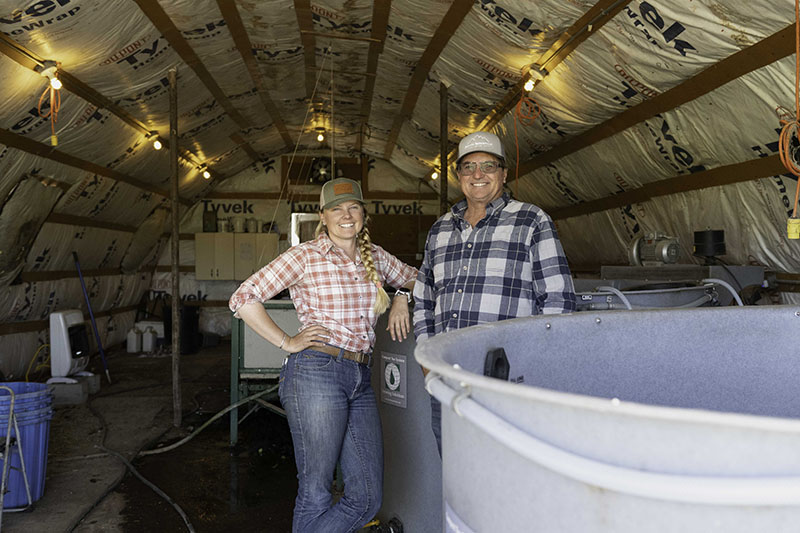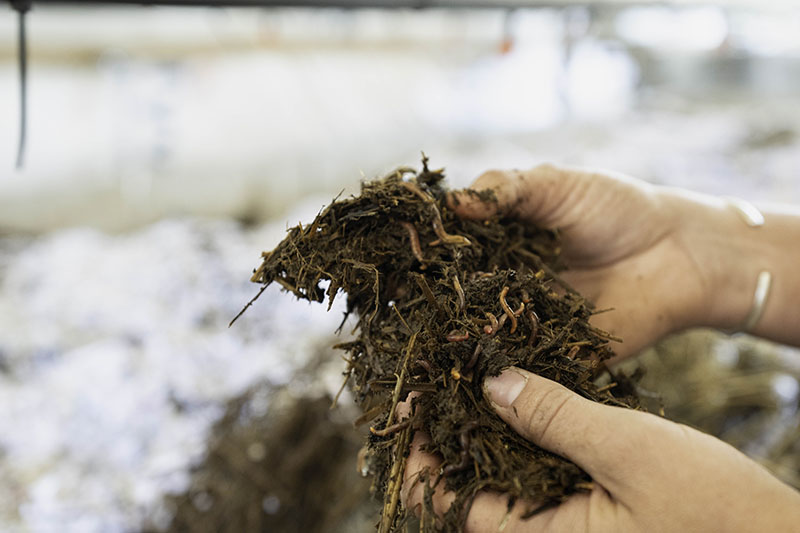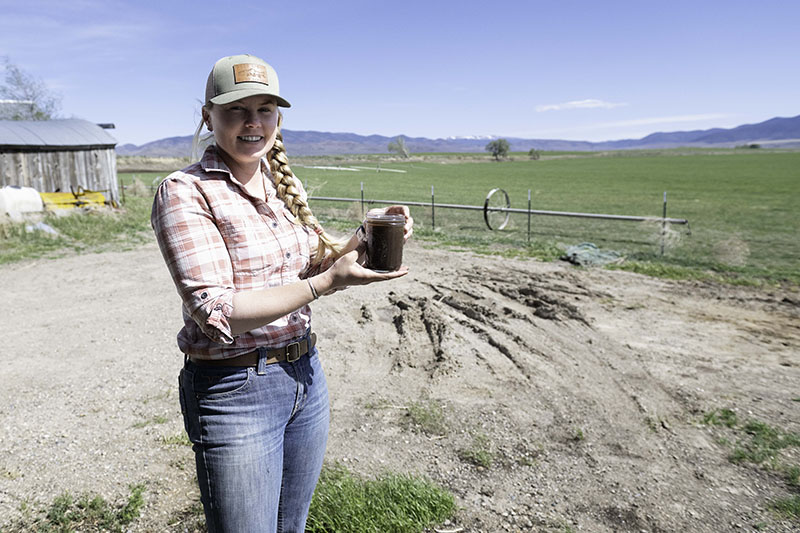Wiggle your way to wondrous soil using worms.
Those wriggling invertebrates in your garden bed may look unappealing, but they actually are working hard to help your plants grow.
Vermiculture and vermicompost, the cultivation of worms to help convert organic matter into fertilizer, are vital components to soil sustenance. Every day, worms eat their body weight in natural detritus such as decaying leaves or bacteria, breaking down and recycling nutrients they need for plant sustenance.
Emily Fulstone, co-owner of Fulstone Ranches in Smith Valley and vermiculture expert, explains that worms proliferate good microbes in soil. The wiggly wonders have fascinating guts that kill any potential pathogens within five millimeters of them while producing bacterially rich castings, or poop. They also have calciferous glands that break down calcium to enable plants to absorb the needed mineral more easily.
“Worms actually propagate the bacteria that plants need and use symbiotically to uptick nutrients,” Fulstone says. “A huge portion of the bacteria in our soil is the living bacteria, the living fungi, so anything you can do to encourage more life in your soil, the better our environment is, whether you’re a backyard gardener or a large-scale farmer.”
Why Worms?
A seventh-generation cattle rancher in Nevada, Fulstone earned a degree in environmental science and biology from the University of Oregon, using her education to study ecosystems that could benefit her family’s land and livelihood raising cattle and growing hay. (See our story “Down to Earth” in our Spring 2022 issue.)
In 2016, Fulstone began raising worms industrially after researching the positive effects of vermiculture on soil. After generations of using conventional amendments on the ranch land, such as fertilizer and pesticides, its soil had little good bacteria left, Fulstone says.
She researched how microorganisms in the soil help transport nutrients and make plants less susceptible to pests, learning that fertilizers create an unbalanced ecosystem that’s unfriendly to beneficial bacteria.
It’s similar to a human having an energy drink for breakfast versus a well-balanced meal, she says. The energy drink may give someone an energy boost initially, but, eventually, their energy level will crash. However, eating a healthy meal will prolong a person’s energy and well-being.
But worms naturally put that healthy bacteria back into the soil. Within a year of putting a vermiculture bed on her family’s field a couple of times, they’d nearly stopped spraying pesticides altogether.
“Because now we have given those plants the nutrients they need from the bacteria, so we’re putting bacteria out on the fields; that bacteria then breaks down and fixes nutrients in the form in which plants need it and spoon-feeds it to them as they need it,” Fulstone says. “We started doing that, and all of a sudden we needed less pesticide, and now we’re needing less fertilizer over time as we make our fields more and more self-sustainable.”
Vermiculture had successfully balanced the ranch’s soil nutrition and enriched its living biology, which, in turn, lessened the need for pesticides and fertilizers.
Vermiculturists such as Fulstone create what they call a “tea” from worm castings.
When an aphid infestation threatened surrounding farms and began encroaching on their own, the Fulstones witnessed the benefits of their vermiculture program. After identifying the pests on their plants, instead of resorting to chemical eradication, they sprayed the casting tea on their crops first.
Within three days, about 90 percent of the aphids on their property had died, she says.

The beneficial bacteria of the soil, which the tea had brought to it, enabled the plant to naturally raise its sugar content to such a high level that the sensitive aphids could no longer digest it, and they eventually died.
However, adding living bacteria back to the soil and avoiding pesticides protected the aphids’ natural enemies, ladybugs, so the polka-dotted predators managed to eradicate the remaining aphids threatening the property.
Worms also help spread advantageous fungi and assist with both water uptake in plants and the earth’s natural composting process. For example, Fulstone put vermicompost on a cornfield that had been fallow for five years but wasn’t decomposing. Within 24 hours of adding the bacteria-rich compost, the cornstalks began breaking down.
Fulstone explains that incorporating vermiculture into your garden also can increase the flavor in your grown produce. For instance, she says, foods such as tomatoes get their flavor profiles from the plant’s vitamin and nutrient content, which increases thanks to the beneficial bacteria you feed your soil and helped transport those nutrients to the plants.
If you’ve ever had a mealy tomato, it likely had low nutritional content due to the conventional (read: chemical) agricultural practices used in growing it.
Incorporate Vermiculture in Your Garden
Creating your own vermiculture system isn’t difficult; you just need the worms, housing in which to proliferate them, and a pass-through bin to catch their castings, from which the beneficial worm tea is created.
Fulstone recommends red wigglers, or Eisenia fetida, but not the kind from the local fishing store.
Also, keep in mind that worms can be raised anywhere, even in a closet, but they love a tropical environment and need humidity of about 70 percent with temperatures around 78 degrees F to live. If they dry out, they die.

At Fulstone Ranches, a sprinkler system is used to maintain moisture in the air for its large-scale vermiculture system, but Fulstone suggests home gardeners feed their worms cardboard, a delicious carbon source for them, soaked in water to assist with this process. However, if it starts smelling like sulfur, it’s too wet, so the bed needs to be fluffed.
While Fulstone does not commercially sell the ranch’s vermicompost, Full Circle Soils & Compost based in Minden offers a Wiggle Kit, available locally, containing the worms and worm food necessary to get you started. If raising worms isn’t your thing, Full Circle Compost sells a plant probiotic called PUNCH made from its vermiculture systems. Area nurseries also sell Full Circle Compost’s premade vermiculture products, plus worm castings that can simply be put in a bucket of water and poured on top of your plants or even sprayed on seeds before planting, for optimal garden results.
Fulstone says the worms, as well as the bins needed to house them and catch their castings, also can be purchased online. She recommends feeding the worms 60 percent carbon, or brown matter such as cardboard or dried leaves, and the remaining 40 percent green matter, such as food scraps. The more broken down their food source, the quicker the worms ingest it. It takes about six months for the Fulstones’ sizable worm bed to proffer harvestable tea that’s full of good bacteria and secondary metabolites the soil needs.
Vermiculture and vermicomposting can help ramp up your garden’s health by jumpstarting carbon, beneficial bacteria, living fungi, and all-around better biology in your soil. Your plants will appreciate your efforts.


